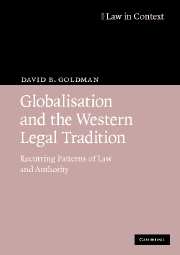Book contents
- Frontmatter
- Contents
- Preface
- 1 Introduction
- Part 1 Towards a Globalist Jurisprudence
- Part 2 A Holy Roman Empire
- Part 3 State Formation and Reformation
- 6 Territorial law and the rise of the state
- 7 The reformation of state authority
- Part 4 A Wholly Mammon Empire?
- Part 5 Competing Jurisdictions Case Studies
- Bibliography
- Index
7 - The reformation of state authority
Published online by Cambridge University Press: 30 March 2010
- Frontmatter
- Contents
- Preface
- 1 Introduction
- Part 1 Towards a Globalist Jurisprudence
- Part 2 A Holy Roman Empire
- Part 3 State Formation and Reformation
- 6 Territorial law and the rise of the state
- 7 The reformation of state authority
- Part 4 A Wholly Mammon Empire?
- Part 5 Competing Jurisdictions Case Studies
- Bibliography
- Index
Summary
If today it is possible to speak of the ‘globalisation of law’, we might equally speak of the ‘state-isation of law’ which was occurring in the sixteenth century. Looking to that process shows the triumph of state and territorial constitutions over the universalist constitution of the Catholic church. The arrival of Protestantism receives less than its deserved acknowledgement for its contribution to territorial sovereignty as we know it. By effectively acknowledging the king as emperor in his realm and allowing him to use law as a policy tool through legislation, the Protestant Reformations transformed the universalist Two Swords legal pluralism which operated as a constitution of moderation between the Catholic church and the kingdoms. Capitalism and the rise of market values were to become readily justifiable by a new approach to ultimate reality and meaning which emphasised personal rather than church responsibility for salvation. As the Catholic church lost control of vital social institutions through the de-legitimatisation of its ‘holy’ doctrine, the state took over those institutions through doctrines more conducive to Mammon.
The neglect of the Protestant Reformations by legal theory
Neil MacCormick has, in passing, recognised the importance to modernity of ‘the epoch of reformation and religious wars in sixteenth- and seventeenth-century Europe’. ‘The Reformation has not been investigated as an event in the history of the law’, wrote Sir Geoffrey Elton about the Henrician Reformation in England. The Reformations were largely responsible for the processes which made the sovereign state into the constitutional entity challenged by globalisation. The Protestant Reformations are an untapped resource for comprehending the diverse, particular authorities which were established in opposition to the universalism of our rhetorical holy Roman empire.
- Type
- Chapter
- Information
- Globalisation and the Western Legal TraditionRecurring Patterns of Law and Authority, pp. 144 - 170Publisher: Cambridge University PressPrint publication year: 2008



